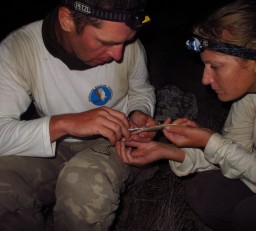Round Island boas island-hopping to save their species
30/03/2012
To safeguard their future, Gunner’s Quoin has been stripped of rats, cats, mice, hares, rabbits and goats – all taking a hand in decimating bird and reptile populations by eating eggs, predating on adults and destroying habitats.

A species of rare snake could be trans-located to a new island home by the Mauritius Wildlife Foundation – with WVI as veterinary adviser and controller. The endangered Round Island boa was confined to the island it takes its name from, as Round Island is of the few islands in the Indian Ocean not to be infested with rats. Long term restoration and conservation activities, and Round Island’s protected status as a no-access closed nature reserve, has resulted in a closely monitored, and healthy boa population. Careful modelling determined that removing some adults from the 800-strong population to establish a new population on neighbouring Gunner’s Quoin will not jeopardise the species, although they will continue to be carefully monitored. To safeguard their future, Gunner’s Quoin has been stripped of rats, cats, mice, hares, rabbits and goats – all taking a hand in decimating bird and reptile populations by eating eggs, predating on adults and destroying habitat. In addition, all introduced plants have been weeded out – no mean feat – and native species replanted for the re-introduction to meet International Union for Conservation of Nature (IUCN) Reintroduction Guidelines [link]on removal of threats. WVI vet Andrew Greenwood supervised a disease risk assessment to ensure that no new disease is introduced to Gunner’s Quoin, also part of the IUCN’s guidelines. In March, 30 boas were caught and blood smears, blood serum and cloacal swabs taken for be analysis to indicate parasite loads and disease levels. As veterinary advisor to the project, Andrew will have the last say as to whether this translocation of snakes goes ahead. Assuming all is well, 40 healthy adult boas will be caught on Round Island, samples taken for baseline data, routinely health screened and taken to Gunner’s Quoin under sterile conditions. Once on Gunner’s Quoin, the boas will be released and monitored to see how they fair in creating a new population and help secure survival of their species.
.png)
.png)

.png)
.png)







.png)






.png)
.png)




.png)


